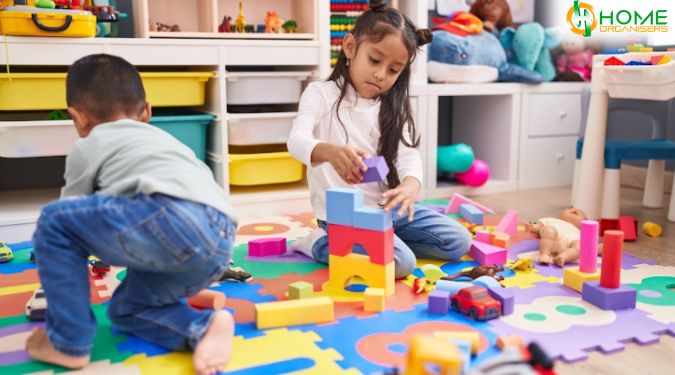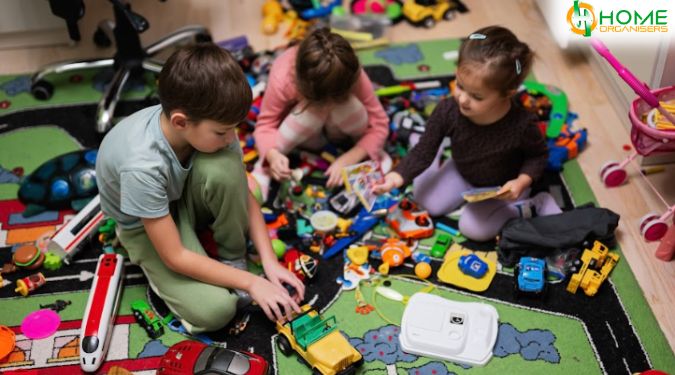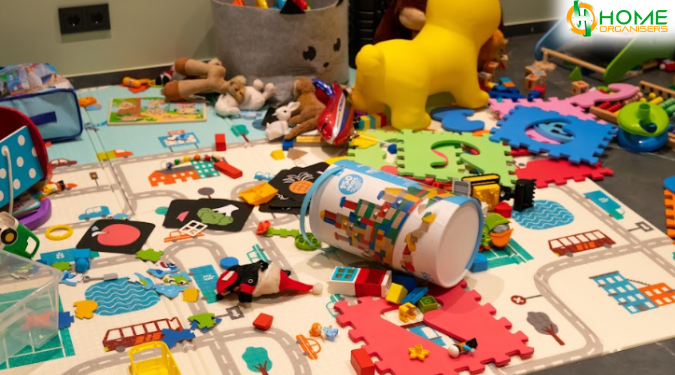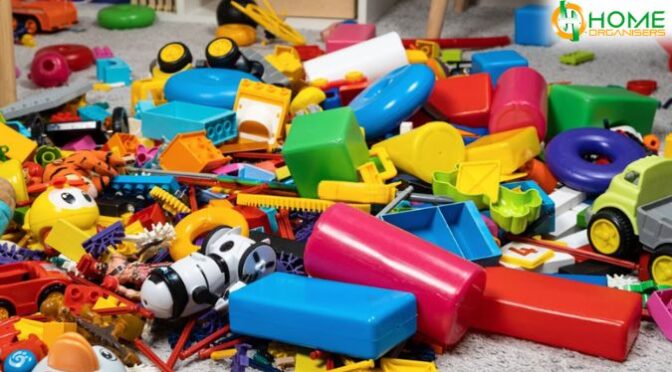As a professional Home Organiser, you understand the transformative power of how to declutter and organise a kids’ playroom. One area that often challenges parents is the playroom—a space filled with toys, crafts, and an ever-growing collection of childhood treasures. If left unmanaged, it can quickly spiral into chaos. This guide will walk you through the steps to transform any playroom into an organised paradise, offering practical tips and tricks to share with your clients or implement in your own home.
Step 1: Start with a Blank Canvas
The first step in any playroom makeover is to start fresh. Encourage clients to remove everything from the space—yes, everything. Clearing the room provides a clear view of its potential and allows you to assess how much storage space is truly available. This is an essential step in learning how to declutter and organise a kids’ playroom effectively.
Pro Tip: Use this opportunity to clean the space thoroughly, including dusting shelves, wiping down surfaces, and vacuuming the floors. A clean slate sets the tone for a fresh start.

Step 2: Declutter with Intention
With the room emptied, it’s time to tackle the toys and supplies. Create three piles: keep, donate, and discard. Teach your clients to be ruthless—items that are broken, missing pieces, or no longer age-appropriate should be discarded or donated.
Questions to Ask During Decluttering:
- Does my child still play with this?
- Is it in good condition?
- Does this toy spark joy or serve a purpose?
By focusing on these questions, you can achieve playroom decluttering tips for home organisers that streamline the process.
Step 3: Group Like Items Together
Once the decluttering phase is complete, organise the remaining toys into categories. Examples include:
- Building blocks
- Dolls and action figures
- Puzzles and games
- Arts and crafts supplies
- Books
This step is crucial in creating distinct play zones in a playroom. Grouping similar items makes it easier to find and store toys, enhancing the overall organisation.
Step 4: Invest in Practical Storage Solutions
Organised playrooms rely on smart storage. Recommending the best storage solutions for small playrooms can help maximise space and functionality. Consider these options:
- Clear Bins with Labels: Perfect for storing small toys like Legos or craft supplies. Labels or photos help kids identify what goes where.
- Low Open Shelves: Keep frequently used toys accessible for young children.
- Stackable Baskets: Great for storing bulky items like stuffed animals or sports equipment.
- Furniture with Built-In Storage: Ottomans, benches, or tables with hidden compartments maximise space.
For a cohesive look, incorporate child-friendly storage solutions for toys that are both functional and safe.

Step 5: Create Play Zones
Designing distinct play zones in a playroom helps to establish boundaries and promotes a sense of order. Here’s how to divide the space:
- Reading Corner: A cozy nook with a small bookshelf and comfy cushions.
- Art Station: A dedicated table with washable surfaces and bins for craft supplies.
- Building Area: Space for blocks and construction toys, with a soft mat to protect floors.
- Imaginative Play Zone: An area for pretend play with costumes, play kitchens, or dollhouses.
These organised playroom ideas for busy families make it easy to maintain structure and encourage creative play.
Step 6: Incorporate Stylish and Durable Décor
While functionality is key, aesthetics shouldn’t be overlooked. Help your clients select stylish and functional playroom decor ideas that make the space inviting for both kids and adults. Consider:
- Wall Art: Use playful, age-appropriate prints to brighten the space.
- Rugs and Mats: Choose easy-to-clean options that add comfort and visual appeal.
- Lighting: Install soft, ambient lighting for a warm and inviting atmosphere.
Opt for durable, easy-to-maintain materials that can withstand the wear and tear of daily use while achieving a polished look.

Step 7: Teach Maintenance Habits
Even the most organised playroom will fall into disarray without a system for upkeep. Share these tips for maintaining an organised playroom long-term:
- Daily Clean-Up Routine: Encourage children to spend 10-15 minutes tidying up before bedtime.
- Toy Rotation: Periodically switch out toys to keep the playroom fresh and exciting while reducing clutter.
- Regular Decluttering: Set a schedule for reviewing toys and supplies every few months.
These easy playroom organisation tips for parents ensure the space remains tidy and stress-free.
Benefits of an Organised Playroom
An organised playroom offers more than just aesthetic appeal. Highlight these benefits of a clutter-free playroom for kids:
- Encourages Independent Play: When toys are easy to find, kids are more likely to play without assistance.
- Boosts Creativity: A clutter-free environment allows children to focus and explore their imagination.
- Saves Time and Stress: No more frantic searches for missing toys or stepping on Legos!
- Promotes Responsibility: Teaching children to clean up instills lifelong organisational skills.
Overcoming Common Challenges
Sometimes clients may feel overwhelmed by the process or worry about maintaining the space long-term. Reassure them with these solutions:
- Challenge: “There’s not enough space!”
- Solution: Maximise vertical space with wall-mounted shelves and hooks.
- Challenge: “My child doesn’t want to let go of any toys.”
- Solution: Frame decluttering as a way to help other children by donating toys.
- Challenge: “It never stays tidy!”
- Solution: Reinforce daily habits and make storage accessible for kids to encourage consistent clean-up.
Conclusion: A Playroom Paradise Awaits
Transforming a chaotic playroom into an organised paradise may seem daunting, but with the right approach and tools, it’s entirely achievable. By focusing on how to declutter and organise a kids’ playroom, selecting the best storage solutions for small playrooms, and creating distinct play zones in a playroom, you’ll set families up for success.
These organised playroom ideas for busy families and playroom decluttering tips for home organisers will ensure children thrive in a space that fosters creativity and joy. Encourage your clients to embrace the journey and enjoy the rewards of an organised, functional, and beautiful playroom!



